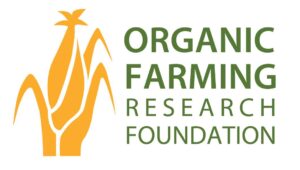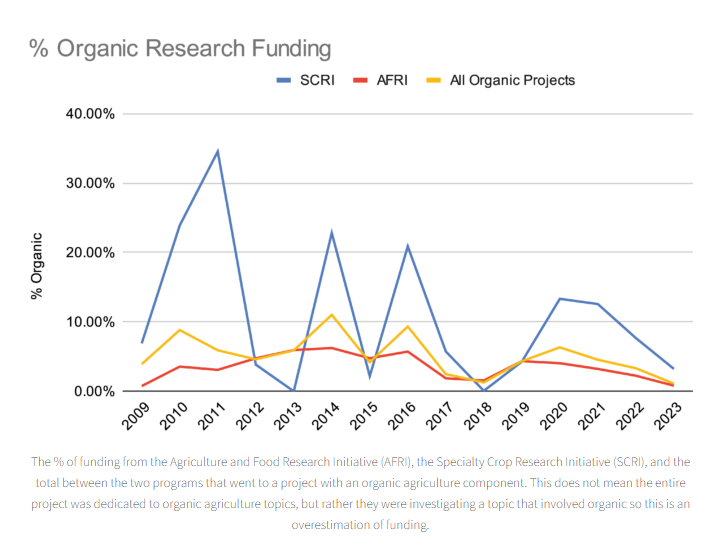May 1, 2024
Commentary: Organic research grants critical to growth
As the world becomes increasingly attuned to the sustainability and health implications of our food systems, the role of organic agriculture has never been more crucial.
Organic management has been shown to not only build resilience in ecological systems, but also in economic ones. However, recent developments in the Presidential Budget Request for fiscal year 2025 (PBR25) reveal a concerning decrease in funding specifically allocated for organic-dedicated competitive grant programs. This shift requires a closer look and a strong response from the scientific community, policymakers and funding agencies alike. We aim to look at the justifications given for these policy changes, and discuss the impacts that will follow if these changes are made.
A closer look at the funding shift
 USDA’s National Institute of Food and Agriculture (NIFA) proposes to reduce funding for the Organic Transitions Research Program, opting to include more organic research through broader programs like the Agriculture and Food Research Initiative (AFRI) and the Specialty Crops Research Initiative (SCRI). The rationale provided for this shift hinges on two main points. First, that NIFA is transitioning away from its integrated (§406) authority* to focus on congressionally authorized programs. Put simply, NIFA’s integrated authority is a method for NIFA to answer research and extension questions related to issues not sufficiently covered by existing programming. Second, and relatedly, that several initiatives already support organic research at a substantial level. Despite these justifications, there is substantial evidence to suggest that AFRI and SCRI have historically not allocated adequate resources specifically to organic agriculture research, even with Congressional direction to do so.
USDA’s National Institute of Food and Agriculture (NIFA) proposes to reduce funding for the Organic Transitions Research Program, opting to include more organic research through broader programs like the Agriculture and Food Research Initiative (AFRI) and the Specialty Crops Research Initiative (SCRI). The rationale provided for this shift hinges on two main points. First, that NIFA is transitioning away from its integrated (§406) authority* to focus on congressionally authorized programs. Put simply, NIFA’s integrated authority is a method for NIFA to answer research and extension questions related to issues not sufficiently covered by existing programming. Second, and relatedly, that several initiatives already support organic research at a substantial level. Despite these justifications, there is substantial evidence to suggest that AFRI and SCRI have historically not allocated adequate resources specifically to organic agriculture research, even with Congressional direction to do so.
The gap in organic research funding
While it is true that the Organic Research and Extension Initiative (OREI) exists to support organic agriculture, the decrease in dedicated funding for organic research in the PBR25 undermines the growth of organic farming practices, which are vital to addressing environmental challenges and health concerns. A review of the research projects awarded through SCRI and AFRI from 2009-2023 shows that the allocation for organic research does not meet the ongoing need. Within AFRI, funding levels have been historically substantial but have been falling short recently, while organic continues to grow its market share and presence. Through SCRI, funding has been sporadic and ultimately makes a small dent in the total funding for organic research topics. This underinvestment can lead to limits on the ability of these sectors to thrive or innovate at the pace required to address pressing agricultural challenges.

As the world becomes increasingly attuned to the sustainability and health implications of our food systems, the role of organic agriculture has never been more crucial. Organic management has been shown to not only build resilience in ecological systems, but also in economic ones. However, recent developments in the Presidential Budget Request for fiscal year 2025 (PBR25) reveal a concerning decrease in funding specifically allocated for organic-dedicated competitive grant programs. This shift requires a closer look and a strong response from the scientific community, policymakers, and funding agencies alike. In this blog, we aim to look at the justifications given for these policy changes, and discuss the impacts that will follow if these changes are made.
A closer look at the funding shift
The National Institute of Food and Agriculture (NIFA) proposes to reduce funding for the Organic Transitions Research Program, opting to include more organic research through broader programs like the Agriculture and Food Research Initiative (AFRI) and the Specialty Crops Research Initiative (SCRI). The rationale provided for this shift hinges on two main points. First, that NIFA is transitioning away from its integrated (§406) authority* to focus on congressionally authorized programs. Put simply, NIFA’s integrated authority is a method for NIFA to answer research and extension questions related to issues not sufficiently covered by existing programming. Second, and relatedly, that several initiatives already support organic research at a substantial level. Despite these justifications, there is substantial evidence to suggest that AFRI and SCRI have historically not allocated adequate resources specifically to organic agriculture research, even with Congressional direction to do so.
The gap in organic research funding
While it is true that the Organic Research and Extension Initiative (OREI) exists to support organic agriculture, the decrease in dedicated funding for organic research in the PBR25 undermines the growth of organic farming practices, which are vital to addressing environmental challenges and health concerns. A review of the research projects awarded through SCRI and AFRI from 2009-2023 shows that the allocation for organic research does not meet the ongoing need.
 Within AFRI, funding levels have been historically substantial but have been falling short recently, while organic continues to grow its market share and presence. Through SCRI, funding has been sporadic and ultimately makes a small dent in the total funding for organic research topics. This underinvestment can lead to limits on the ability of these sectors to thrive or innovate at the pace required to address pressing agricultural challenges.
Within AFRI, funding levels have been historically substantial but have been falling short recently, while organic continues to grow its market share and presence. Through SCRI, funding has been sporadic and ultimately makes a small dent in the total funding for organic research topics. This underinvestment can lead to limits on the ability of these sectors to thrive or innovate at the pace required to address pressing agricultural challenges.
The NORA-22 report confirmed that there are persistent challenges that also possess regional wrinkles and peculiarities. Without robust, consistent investments into organic agriculture research projects investigating these topics, the Organic Sector will not be able to reach its full potential or meet the need for a climate-resilient food and farm system. Given all of the investments being made by the USDA to support transitioning growers into organic farming through the Organic Transition Initiative, there is a significant need to make sure that when producers have questions, they can readily find the answers. Additionally, even those that are not transitioning into organic certification have time and again been interested in adopting organic practices that are shown to be ecologically sustainable and economically viable.
Given these circumstances, it is essential for the scientific community, legislators, and NIFA itself to take proactive steps. These include:
Engage with researchers
The scientific community should be encouraged to apply for more grants that focus on organic agriculture. Increased participation will not only highlight the demand for such funding but also push agencies to allocate more resources toward these areas.
Take legislative action
Congress must play a pivotal role by explicitly directing NIFA to prioritize and expand funding for organic research within AFRI and SCRI programs. Clear legislative directives can realign priorities and ensure that organic agriculture receives the attention and investment it rightly deserves.
Increase agency accountability
NIFA should refine its Request for Applications (RFAs) to emphasize the importance of organic agriculture. By making organic agriculture a highlighted topic in RFAs, NIFA can communicate its significance to the research community and ensure that it is treated as a priority area for funding and development.
The decision to underfund organic research is more than a budgetary adjustment— it’s a statement about priorities. As participants in the formation of a sustainable future, we must advocate for a recalibration of these priorities towards a more robust support system for organic agriculture. Through collective action and a unified voice, we can ensure that organic research is not only preserved but enhanced, fostering an agricultural system that benefits our health, our environment, and future generations.
* “The Integrated Research, Education, and Extension (IREE) Competitive Grants Program was authorized in Section 406 (7 U.S.C. 7626) of AREERA to fund integrated, multifunctional agricultural research, education, and extension activities. While the overall approach to solving critical agricultural issues, priorities, or problems will be through an integration of research, education, and extension activities, within IREE individual programs may request applications that are research, education, or extension only, or a combination thereof.” Integrated Applications Information, NIFA
For more information on how to become involved, visit the OFRF or NSCA websites.









